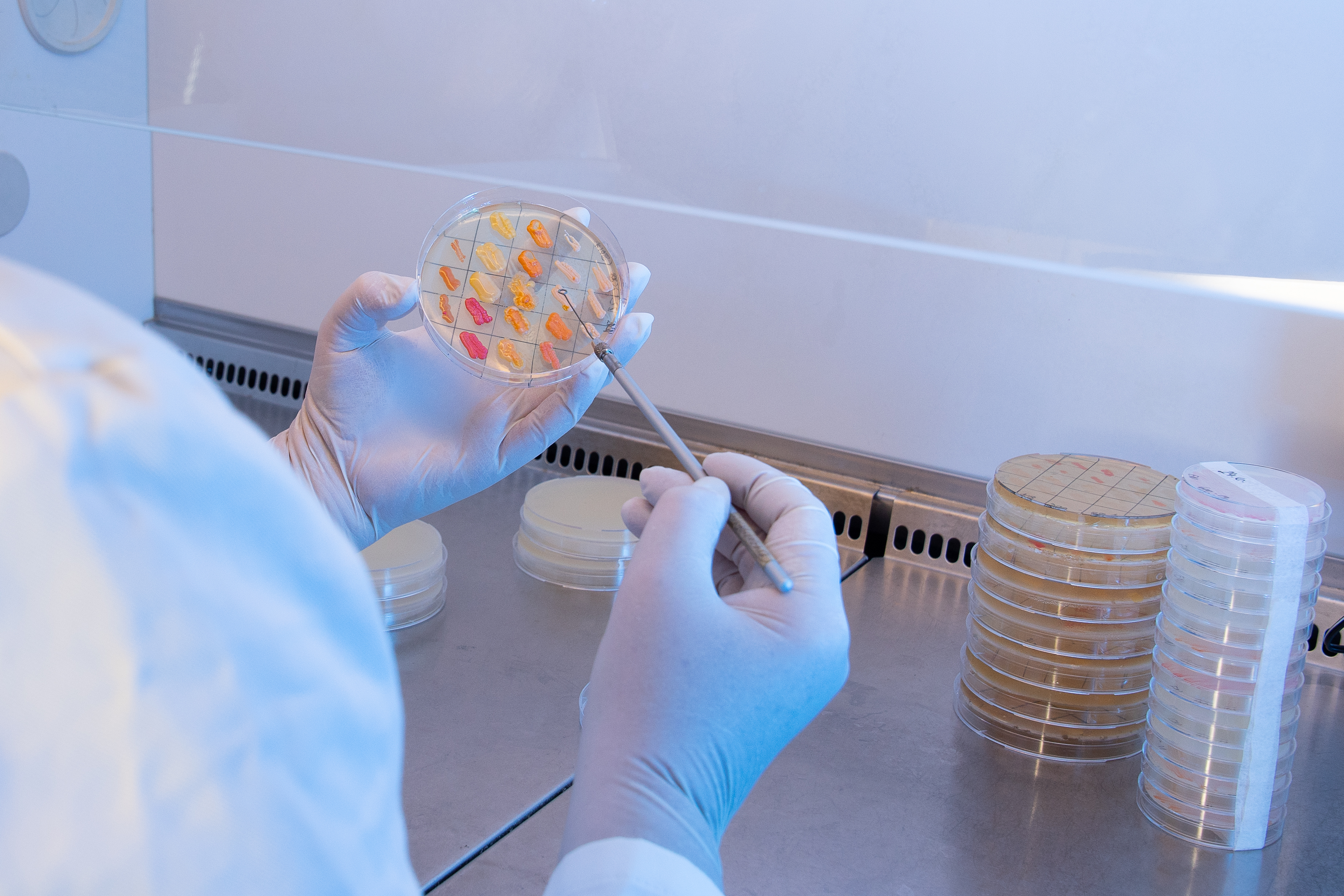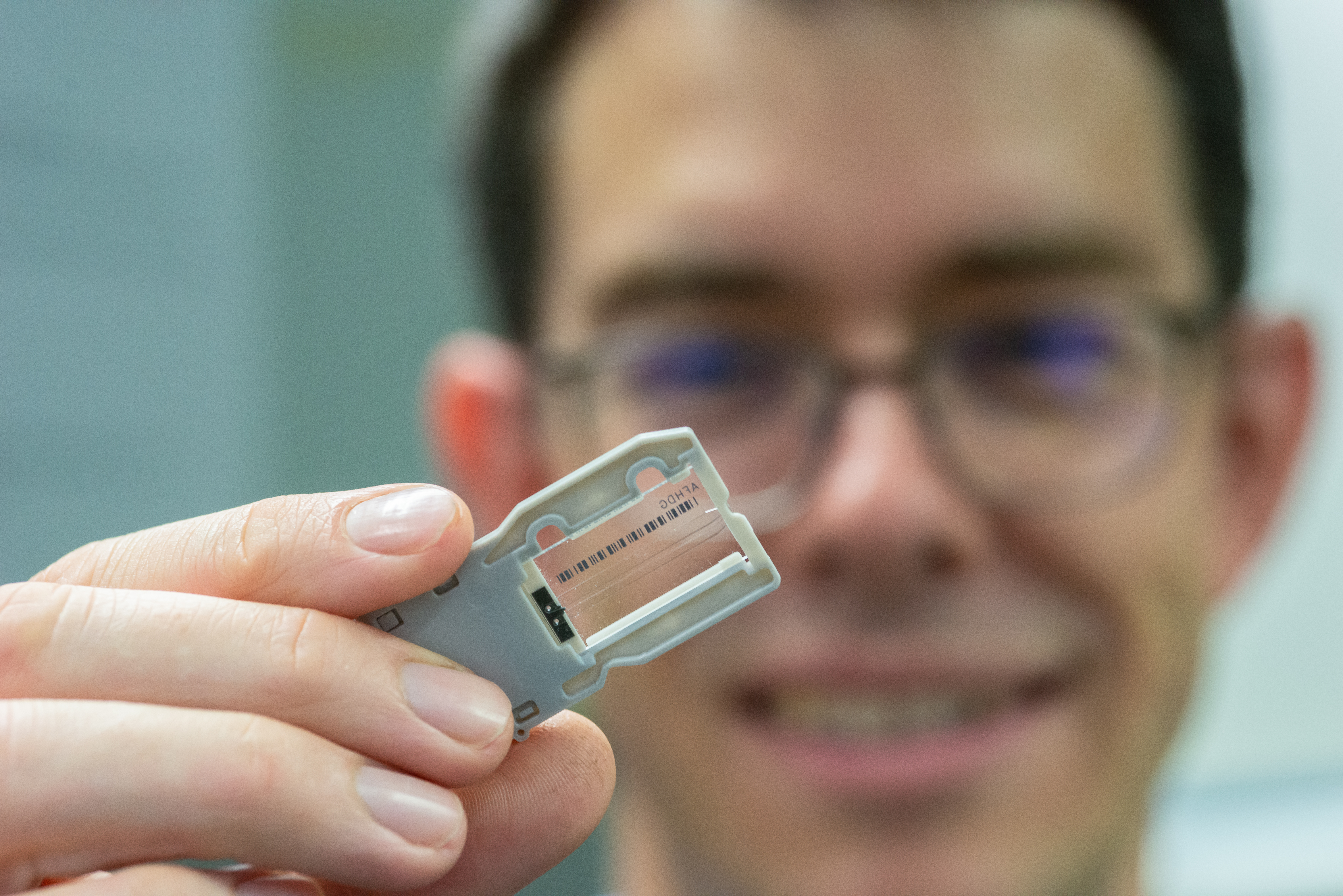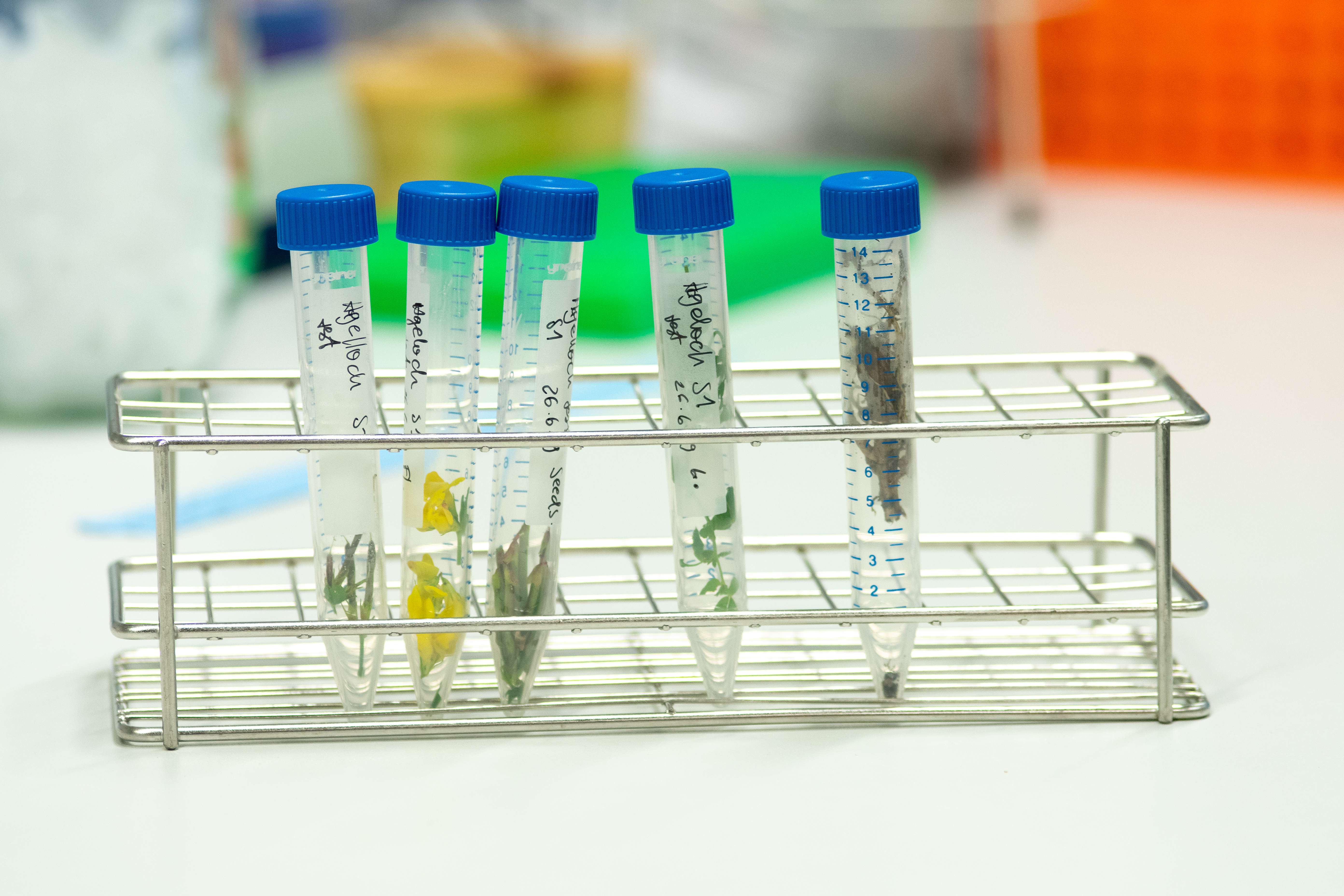Mikrobielle Interaktionen in pflanzlichen Ökosystemen
Mikrobielle Interaktionen in Pflanzenökosystemen
Wir sind ein interdisziplinäres Team, das Mikrobiologie, Pflanzenwissenschaften, Ökologie und computergestützte Biologie verbindet. Als Mitglieder des Zentrums für Molekularbiologie der Pflanzen (ZMBP) und des Interfakultären Instituts für Mikrobiologie und Infektionsmedizin Tübingen (IMIT) widmen wir uns der Erforschung grundlegender Mechanismen, durch die zufällige mikrobielle Einträge in gut definierte, oft wirtsspezifische mikrobielle Gemeinschaften überführt werden. Unsere Expertise ermöglicht es uns, komplexe Fragen zur Dynamik mikrobieller Gemeinschaften zu bearbeiten, indem wir experimentelle und computergestützte Ansätze kombinieren, um Einblicke in mikrobielle Interaktionen und deren Rolle für die Pflanzengesundheit und Anpassung zu gewinnen.
Forschungsprojekte und Schwerpunkte:
- Die Verwendung synthetischer Gemeinschaften zur Entschlüsselung der Dynamik von komplexen mikrobiellen Gemeinschaften
- Die Identifikation stressbedingter Mikrobiota aus endophytischen, pflanzlichen Habitaten
- Lokale Ko-Adaptation von Cakile maritima und ihrer Mikrobiota an klimatischen Stress
- Durch Mikrobiota geförderte Pathogenität in der Phyllosphäre von Arabidopsis
- Die Bedeutung von Basidiomyceten-Hefen in komplexen Blatt-Mikrobiota-Gemeinschaften
- Ökologie der Mikrobiota in Lotus corniculatus
- Reduzierung der Eisentoxizität mit Hilfe des Pflanzenmikrobioms zur Sicherung des Ertrags von Reis
Eine vollständige Übersicht über alle Projekte finden Sie auf unserer Seite „Forschungsübersicht“.
Forschungs Interesse:
Unsere Forschung konzentriert sich auf die Dynamik von Wechselwirkungen innerhalb pflanzenassoziierter mikrobieller Gemeinschaften und darauf, wie diese Interaktionen die Gesundheit, Anpassungsfähigkeit und Widerstandskraft von Pflanzen unter unterschiedlichen Umweltbedingungen fördern. Wir untersuchen die Vielfalt der Mikroorganismen sowohl in endophytischen (im Inneren der Pflanze) als auch in epiphytischen (an der Pflanzenoberfläche) mikrobiellen Gemeinschaften. Dabei analysieren wir, wie verschiedene Faktoren die Zusammensetzung und Stabilität dieser mikrobiellen Gemeinschaften beeinflussen. Dazu gehören der Genotyp der Pflanze, Umweltstressoren und die Kommunikation zwischen den Mikroben.
In natürlichen Ökosystemen sind Pflanzen ständig abiotischen Belastungen wie extremen Temperaturschwankungen, variierenden Feuchtigkeitsverhältnisse und Nährstoffungleichgewichten ausgesetzt. Wir erforschen, wie sich diese Stressfaktoren auf die Interaktionen zwischen Pflanzen und Mikroben sowie zwischen den Mikroben selbst auswirken – besonders in harschen Umgebungen, in denen die Mikroorganismen kooperieren müssen, um ihre Wirte und damit ihre ökologische Nische zu unterstützen. Durch die Untersuchung dieser mikrobiellen Gemeinschaften in Feldstudien und kontrollierten Experimenten möchten wir verstehen, wie pflanzenassoziierte Mikroben zu Mechanismen der Stressbewältigung beitragen, etwa zur Entgiftung von Eisen bei Reis, zur Trockenheitstoleranz, zur Unterdrückung von Krankheitserregern bei Modellpflanzen wie Arabidopsis und zu Anpassungen an harsche Umweltbedingungen und pathogene Mikroorganismen bei Grünlandarten wie Lotus corniculatus.
Zusätzlich integrieren wir synthetische Biologie und Bioinformatik in unsere Forschung, um die Bildung mikrobieller Gemeinschaften zu modellieren, nützliche Interaktionen vorherzusagen und probiotische Ansätze für eine nachhaltige Pflanzengesundheit zu entwickeln. Mit experimentellen und computergestützten Methoden erforschen wir, wie sich die mikrobielle Vielfalt und Funktionalität unter Umwelteinflüssen verändern. Unser Ziel ist es, das Potenzial dieser mikrobiellen Gemeinschaften für landwirtschaftliche und ökologische Anwendungen zu nutzen und zu steuern.
Forschungsdatenmanagement (FDM):
Da wir eine Vielzahl von Methoden zur Generierung und Analyse von Hochdurchsatzdaten einsetzen, ist eine stark strukturierte Datenverwaltung zu einer Schlüsseldisziplin in unserem Forschungsbereich geworden. Bei all unseren Projekten, einschließlich DeCoCt, PlantMicrobe, PlantsCoChallenge, DECRyPT und den Reis-Mikrobiom-Studien, wenden wir die FAIR-Prinzipien (auffindbar, zugänglich, interoperabel und wiederverwendbar) an, um sicherzustellen, dass Daten und Metadaten standardisiert, zugänglich und integrierbar sind. Dieser Ansatz ermöglicht einen nahtlosen Datenaustausch, fortschrittliche rechnergestützte Analysen und die Reproduzierbarkeit, die erforderlich ist, um die Dynamik mikrobieller Gemeinschaften zu analysieren und Strategien zur Stärkung der Widerstandsfähigkeit von Pflanzen zu verbessern.
Universität Tübingen
IMIT/ZMBP
Mikrobielle Interaktionen
Auf der Morgenstelle 32
D-72076 Tübingen
Raum 4Q22
Koordinator
Prof. Dr. Eric Kemen
eric.kemenspam prevention@zmbp.uni-tuebingen.de
+49-7071/29-78725
Sekretariat
Die Position im Sekretariat ist zurzeit unbesetzt.
Science Podcast: Key To My Research - Can Plants Beat Climate Stress?
Microbiome of plants: In this Episode of Key To My Research, the science podcast by the excellence strategy at the University of Tübingen we dive into the groundbreaking work of Prof. Dr. Eric Kemen. We explore the world of plant resilience. Discover how Prof. Kemens research on microbial interactions in plant ecosystems could revolutionize agriculture and help us tackle the pressing issue of food security in the face of climate change.
Listen
KEY TO MY RESEARCH
Can Plants Beat Climate Stress? – Prof. Dr. Eric Kemen
Host:
Welcome to Key To My Research the science podcast by the Excellence Strategy at the University of Tübingen. In this podcast, we explain in a simple way how outstanding scientists are researching complex topics that affect our everyday lives.
My name is Jennifer, and I’m your host.
In todays episode, we will get to know Professor Eric Kemen.
Prof. Kemen:
Our main goal in general is to figure out what does it mean for a plant to become robust.
Host:
He researches Microbial Interactions in Plant Ecosystems at the Interfaculty Institute of Microbiology and Infection Medicine in Tübingen. And he is researching Microbial Interactions in Plant Ecosystems.
Here is an example:
Prolonged periods of drought or flooding cause entire harvests to fail because our crops cannot survive them. But nature quickly turns green again after such extreme conditions. Why is that?
Prof. Kemen:
Key to my research is for sure to understand from an ecological point of view where plants are growing, how they are growing, what are the environmental factors, and to go down from these ecological aspects to the individual genes and how they function.
So that is also what motivates me all the time to do my work. It's really that the way of understanding how on the really small scale we can understand how this basically translates later on in an ecological or agricultural context.
Host:
Before becoming a professor, Eric Kemen would have liked to have worked in agriculture and become a farmer.
Prof. Kemen:
I would have probably become a more organic farming person. So I was always interested in alternative farming, so where you basically don't use a lot of agrochemicals, but where you basically use more the natural resources that exist in order to build up your farm. So that would have been my idea. But of course it's not easy if you don't come from a farm to become a farmer and to get land to do this, actually. So this then had to be an idea and stayed very theoretical.
Host:
Perhaps as theoretical as his research is today. Professor Kemen and his team are doing basic research. Their goal is to be able to apply their science to agriculture one day. But for now, it remains at a theoretical level.
Prof. Kemen:
Our main goal in general is to figure out what does it mean for a plant to become robust. So what does it mean if you stand out there, and you suddenly have sun that burns down like hell and basically their temperature increases to 60 degrees because the ground gets hot to 70 degrees and the plant has to stay. And then during the night it suddenly drops or in winter it drops really below zero and so on. But still the plant basically stays, and we have not really a good idea what this robustness is and how we can basically change it or adapt it.
Host:
The big question is, how do we get back the resilience of wild plants while maintaining the yield of our agricultural crops?
Prof. Kemen:
One has to be aware that we have to feed more and more people on the earth. So basically we cannot really risk that we are producing less. So we really have to see that we get this plant robust by learning something from the nature.
It's very difficult to really breed in all these genes with classical breeding in the real time that we need with these genes because we are already seeing that we have very harsh conditions for our plants that I mean most people have really faced already this year and will face also during the summer really extreme temperature, extreme hot, extreme water. And of course there the plants need to adapt, and we need to find a way how to really get this to the agriculture very quickly.
Host:
What Professor Kemen means is that it is much easier to work with so-called transgenes or genetically modified plants. The use of genetic engineering in agriculture is controversial. The German Environment Ministry warns of herbicide resistance. Professor Kemen understands the criticism. He says that if the manipulation is done in a safe environment, just by introducing specific genes into the plant, it can help achieve faster results and be more resilient in the face of climate change. According to Professor Kemen, time is running.
Prof. Kemen:
I think it's the timeline within the next 10 years that we really have to find what makes the plants robust. So what makes them really survive in nature. And then we have to get this as quickly as possible into the crops that they become really robust.
Host:
That is why the University of Tübingen is the right place. Professor Kemen says it is the perfect combination of disciplines that makes this university so unique.
Prof. Kemen:
Here the plant research is really a focus. So there we are in one big institute where we are only looking at plant research. And we also are associated with ecology, for example, that also has a big part looking into plant. And this is really a center for plant science. And of course, this is a big advantage if you have colleagues nearby that all work on plants and all different aspects. And this is, I think, one of the unique sites where you have such a focus that so many groups work with the same interest on the same topic. And for me, it was also interesting to come here and very important because it's not only plant sciences, but we also have a very strong microbiology. And within this microbiology, the microbiome is one of the hot topics and the main topics they are focusing on. And as I'm part also of the microbiology, this is making the perfect environment where one can study on one side the plant, one can study the micro, and one can really bring this together with the ecology to study how plants interact with their environment to really survive these harsh conditions.
Host:
And for Professor Kemen, this little town has a lot more to offer than that.
Prof. Kemen:
What I really like about Tübingen is that first of all, it's an extremely international city. So it's a very small city. And usually small cities in Germany are not so international, but Tübingen is completely different. And for me personally, I think what is important is that it's really embedded in natural reserve, like the Schönbuch, which is a huge forest area, which is really natural. And it's really fantastic to go out there and spend days because you can just walk from Tübingen outside, and you can walk for hours and hours and hours just through nature.
Host:
Professor Kemen enjoys sharing this experience with his family. Together they enjoy going into the woods and observing what he calls spectacular nature.
Prof. Kemen:
I don't know if that is of a scientist, but we are the whole family, my kids and my wife, we are very much interested in plants in general. So we are very fascinated by the diversity that is out there. And of course, we want to know which plants are there if we don't know them and try to identify them together. And of course, we are also, since I'm also into microbiology, we are very fascinated by the diseases the plants have. This might sound a bit strange, but there's such a diversity of microbes. You can basically see if you look closer at the plant. So they are, for example, rust fungi, and they make fantastic structures where they release their spores in the environment. And you can see them on the plant. They are very colorful. So there are orange spores, red spores, brown spores, and so on. And this we as a family like very much also to look into those pathogens. Of course, what you find always are a lot of mildew that are outside there. And just seeing by a naked eye how fantastic the diversity is that is out there. And the fantastic thing is also you have all these pathogens there. The plants are still all very healthy. So, and that is, of course, fascinating looking out there in nature. And of course, what we usually have with us is a small pocket microscope. So we usually also try to look closer into insects and whatever we see there, and how the structure also look on the microscopical level to get an idea of what we really find out because these are just fantastic structures. If you look in the microscope and it's so fascinating what nature is generating there.
Host:
This was: “Key To My Research”, a Podcast produced by changing time in cooperation with the University of Tübingen. For more information and links to the sources, see the show notes below. There you can also find a link to the hole interview with Professor Kemen. If you enjoyed this episode, make sure to subscribe to the podcast, leave a review, and recommend it to your friends and colleagues.
Authors: Chris Veit and, Joti Fotiadis.
Special thanks to: Professor Eric Kemen, Heiko Heil, Oliver Häußler, Kurt Schneider and Oliver Lichtwald.
My name is Jennifer and I’m your host. Thanks for listening and see you next time.



